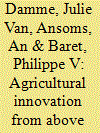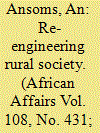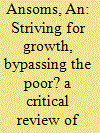| Srl | Item |
| 1 |
ID:
131832


|
|
|
|
|
| Publication |
2014.
|
| Summary/Abstract |
In its 2008 World Development Report, the World Bank pleaded for a 'Green Revolution' for sub-Saharan Africa, pointing particularly to the importance of including smallholder farmers. This article focuses on the banana cropping system in Rwanda, and on the agricultural innovations introduced within this system. We first consider macro-level innovations that are designed to promote a modernized agricultural sector and that correspond to the rationale of the Green Revolution. We analyse how such 'top-down' innovations are received on the ground and show how smallholders seek to evade new government policies when they fail to reflect local economic and social realities. This demonstrates how some rural Rwandans are challenging the authority of the government in disguised ways in order to protect their local livelihoods. The Rwandan experience should inspire continent-wide Green Revolution policies to take account of the risk-coping rationale of small-scale farmers and their capacity to innovate 'from below'.
|
|
|
|
|
|
|
|
|
|
|
|
|
|
|
|
| 2 |
ID:
087723


|
|
|
|
|
| Publication |
2009.
|
| Summary/Abstract |
This article analyses the Rwandan elite's visions and ambitions for a wide-ranging re-engineering of rural society. The post-1994 political elite has few links to rural society and the peasant way of life, and sees little room for small-scale peasant agriculture in Rwanda's economic future. The article shows how current Rwandan policy makers aim to realize three social engineering ambitions: first, to transform the agricultural sector into a professionalized motor for economic growth, centred on competitive and commercial farm units; second, to artificially upgrade rural life by inserting 'modern' techniques and strategies into local realities, while hiding true poverty and inequality; and, finally, to transform Rwanda into a target-driven society from the highest to the lowest level. The article points to the (potential) dangers, flaws, and shortcomings of this rural re-engineering mission, and illustrates how the state as the engineer 'hovers' above the local without consulting those affected. It concludes that contemporary polices are unlikely to be conducive to poverty reduction.
|
|
|
|
|
|
|
|
|
|
|
|
|
|
|
|
| 3 |
ID:
082097


|
|
|
|
|
| Publication |
2008.
|
| Summary/Abstract |
This paper studies the Rwandan case to address some of the challenges and pitfalls in defining pro-poor strategies. The paper first looks at the danger of a purely growth-led development focus (as in Rwanda's first PRSP), and evaluates the extent to which the agricultural sector has been a pro-poor growth engine. It then studies Rwanda's current rural policies, which aim to modernise and 'professionalise' the rural sector. There is a high risk that these rural policy measures will be at the expense of the large mass of small-scale peasants. This paper stresses that the real challenge to transform the rural sector into a true pro-poor growth engine will be to value and incorporate the capacity and potential of small-scale 'non-professional' peasants into the core strategies for rural development. The lessons drawn from the Rwandan case should inspire policy makers and international donors worldwide to shift their focus away from a purely output-led logic towards distribution-oriented rural development policies. In other words, the challenge is to reconcile efficiency in creating economic growth with equity, and perhaps, to put equity first.
|
|
|
|
|
|
|
|
|
|
|
|
|
|
|
|